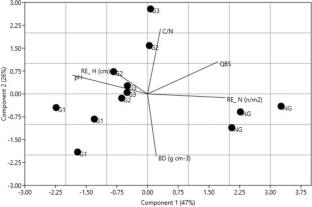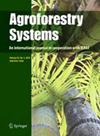Impacts of semi-extensive grazing of Maremma cattle on a Mediterranean agroforestry ecosystem
Abstract
Agroforestry is increasingly recognized as a sustainable strategy to support adaptation to and mitigation of climate change. This multidisciplinary study examines the impacts of semi-extensive grazing of Maremma cattle on a Mediterranean agroforestry system, specifically, a high forest of Turkey oak (Quercus cerris L.). The aims were to identify innovative and sustainable grazing practices to preserve the equilibrium and efficiency of the agroforestry system; and evaluate the effects of different grazing intensities on soil properties, vegetation, and forest structure. Fieldwork was conducted in April- July 2021at the organic agro-silvo-pastoral farm Tenuta di Paganico (Grosseto, Tuscany, central Italy) encompassing four areas with differing grazing intensities, from ungrazed to three levels of stocking density (from 0.36 to 0.71 LSU ha-1 yr-1) and cattle trampling (from 68 to 83 m cattle trampling). Results show that high grazing intensity did not affect organic carbon and nitrogen contents and water permeability, but it caused higher bulk density as compared to medium intensity grazing and similarly to the ungrazed area which is under regular forest management including the passage of mechanical vehicles. Nevertheless, high intensity grazing negatively impacted on soil health and forest structure. Conversely, low stocking density and rotational grazing supported soil biological quality, vegetation diversity and natural regeneration capacity. Grazing intensity did not affect the stands upperstorey, but it affected the understorey and regeneration layers’ composition and development. This study underscores how adaptive grazing management can balance productivity and ecological integrity in Mediterranean agroforestry systems, offering insights for integrating livestock management with sustainable forestry practices.


 求助内容:
求助内容: 应助结果提醒方式:
应助结果提醒方式:


